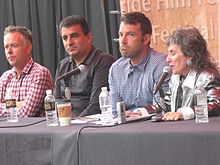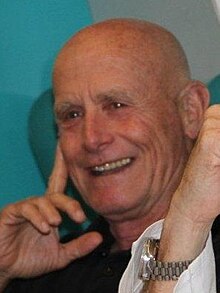The Gatekeepers (film): Difference between revisions
m →Structure: added link |
m →Structure: [ |
||
| Line 40: | Line 40: | ||
* '''The Old Man at the End of the Corridor:''' consisting of reflections on the activities of the Shin Bet and their ethical and strategic impact on the State of Israel. |
* '''The Old Man at the End of the Corridor:''' consisting of reflections on the activities of the Shin Bet and their ethical and strategic impact on the State of Israel. |
||
Though the film follows a loose chronological order, each of these segments also delves into topics such as the controversy surrounding [[collateral damage]], the efficacy of [[torture]], and the morality of [targeted killing|targeted assassination]]. These personal confessions and reflections are among the most powerful moments of the film. Especially noteworthy is Avraham Shalom’s statement that, “On the other hand it's a brutal occupation force, similar to the [[Germans]] in [[World War II]]. Similar, not identical,” and Yaakov Peri’s statement that, “These moments end up etched deep inside you, and when you retire, you become a bit of a leftist.” |
Though the film follows a loose chronological order, each of these segments also delves into topics such as the controversy surrounding [[collateral damage]], the efficacy of [[torture]], and the morality of [[targeted killing|targeted assassination]]. These personal confessions and reflections are among the most powerful moments of the film. Especially noteworthy is Avraham Shalom’s statement that, “On the other hand it's a brutal occupation force, similar to the [[Germans]] in [[World War II]]. Similar, not identical,” and Yaakov Peri’s statement that, “These moments end up etched deep inside you, and when you retire, you become a bit of a leftist.” |
||
The events described in the film are illustrated with archival footage and [[computer-generated imagery]] that brings historic photographs to life. An example of this is the computer-generated reenactment of the 300 bus incident, based on photographs and eyewitness accounts. The film's [[computer animation]]s were created by the French company [[Mac Guff]].<ref name="Mac Guff">{{cite web|title=Mac Guff website|url=http://www.macguff.com/en#/news/1-mac-guff-s-news/62-the-gatekeeper.html|accessdate=15 December 2012}}</ref> |
The events described in the film are illustrated with archival footage and [[computer-generated imagery]] that brings historic photographs to life. An example of this is the computer-generated reenactment of the 300 bus incident, based on photographs and eyewitness accounts. The film's [[computer animation]]s were created by the French company [[Mac Guff]].<ref name="Mac Guff">{{cite web|title=Mac Guff website|url=http://www.macguff.com/en#/news/1-mac-guff-s-news/62-the-gatekeeper.html|accessdate=15 December 2012}}</ref> |
||
Revision as of 21:31, 19 December 2012
| The Gatekeepers שומרי הסף | |
|---|---|
 The director discussing the film at a directors' panel at the Telluride Film Festival. Left to right: Michael Winterbottom, Dror Moreh, Ben Affleck, Annette Insdorf. | |
| Directed by | Dror Moreh |
| Produced by | Dror Moreh Philippa Kowarsky Estelle Fialon |
| Starring | Ami Ayalon Avi Dichter Yuval Diskin Carmi Gillon Yaakov Peri Avraham Shalom |
| Cinematography | Avner Shahaf |
| Edited by | Oron Adar |
| Music by | Ab Ovo Jérôme Chassagnard Régis Baillet |
| Distributed by | Cinephil (international) Sony Picture Classics (U.S.) |
Release dates | 10 July 2012 (Israel: Jerusalem Film Festival) 6 September 2012 (North America: TIFF) 17 November 2012 (Europe: IDFA) |
Running time | 95 minutes |
| Countries | |
| Language | Hebrew |
The Gatekeepers (Hebrew: שומרי הסף) is a 2012 documentary film by director Dror Moreh that tells the story of the Israeli Shin Bet from the perspective of six former heads of Israel’s secretive internal security service. It combines in-depth interviews with archival footage and computer animation to recount the role that the group played in Israel’s security from the Six Day War to the present.[1]
Background
In interviews,[2] Moreh explains that he was inspired to make the film after watching Errol Morris’s Academy Award-winning documentary The Fog of War. Having just completed a film about former Prime Minister Ariel Sharon,[3] he came to realize the decisive role that the Shin Bet had played behind the scenes for the past forty years.

The problem, according to Moreh, was to get the “Gatekeepers,” or former heads of the Shin Bet to agree to appear on camera to discuss their work. Given the secretive nature of the organization, none of them had ever done this before, and many of the topics he hoped to discuss with them were either classified or highly sensitive.
Despite this initial difficulty, Moreh contacted one of the “Gatekeepers,” Ami Ayalon, who had since been elected to the Knesset for the Labor Party and was serving as a Minister without Portfolio in the Security Cabinet. Much to his surprise, Ayalon not only agreed to participate. He also helped Moreh contact the other surviving former heads of the Shin Bet: Avraham Shalom, Yaakov Peri, Carmi Gillon, and Avi Dichter. The sixth participant in the film, Yuval Diskin, was still serving as head of the Shin Bet at the time.
Though all the men agreed to participate, some were reluctant initially to discuss various incidents associated with their careers. Shalom, for instance, did not want to discuss his role in the hijacking of the 300 bus and summary execution of two of the terrorists, though the ensuing scandal ultimately led to his resignation. Over time, however, and with careful prodding, he agreed to discuss even that, and it now features as one of the film’s seven segments.
Structure
The film consists of seven segments:
- No Strategy, Just Tactics: covering the emerging role of the Shin Bet from the Six Day War and the occupation of the Palestinian territories.
- Forget About Morality: about the 300 bus incident.
- One Man’s Terrorist Is Another Man’s Freedom Fighter: about the peace process following the Oslo Accords.
- Our Own Flesh and Blood: about Jewish terrorism, including the Jewish Underground and the assassination of Yitzhak Rabin.
- Victory Is to See You Suffer: about negotiations with the Palestinians during the Second Intifada.
- Collateral Damage: about the assassination of Yahya Ayyash and other prominent Hamas activists.
- The Old Man at the End of the Corridor: consisting of reflections on the activities of the Shin Bet and their ethical and strategic impact on the State of Israel.
Though the film follows a loose chronological order, each of these segments also delves into topics such as the controversy surrounding collateral damage, the efficacy of torture, and the morality of targeted assassination. These personal confessions and reflections are among the most powerful moments of the film. Especially noteworthy is Avraham Shalom’s statement that, “On the other hand it's a brutal occupation force, similar to the Germans in World War II. Similar, not identical,” and Yaakov Peri’s statement that, “These moments end up etched deep inside you, and when you retire, you become a bit of a leftist.”
The events described in the film are illustrated with archival footage and computer-generated imagery that brings historic photographs to life. An example of this is the computer-generated reenactment of the 300 bus incident, based on photographs and eyewitness accounts. The film's computer animations were created by the French company Mac Guff.[4]
Release and reception
Three years in production, the film was first released at the Jerusalem Film Festival in the presence of the Gatekeepers themselves. In North America, it was released on 31 August 2012 by Sony Picture Classics at the Telluride Film Festival in Colorado[5][6] in the presence of Errol Morris, and a week later (6 September 2012), at the Toronto International Film Festival. It also screened at the New York Film Festival. Its first screening in Europe took place at the International Documentary Film Festival in Amsterdam. In addition to a one-week release to make it eligible for the Academy Awards, The Gatekeepers theatrical release in North America is scheduled for February 1.
Yet despite its limited release, the film has already garnered enormous attention from film critics in North America and internationally. The New York Times critic A. O. Scott called the film the best documentary of 2012, deeming it "essential, eye-opening viewing if you think you understand the Middle East,"[7] while Times critic Manohla Dargis named it one of the top ten movies of the year.[8] The film went on to receive the Los Angeles Film Critics Association Award for Best Documentary Film[9] and is currently shortlisted for the Academy Award for Best Documentary Feature.[10]
References
- ^ "Gatekeepers, the Film". Retrieved 13 December 2012.
- ^ "Interview with the director". Retrieved 13 December 2012.
- ^ Wool, Danny. "An Interview with Dror Moreh". Retrieved 14 December 2012.
- ^ "Mac Guff website". Retrieved 15 December 2012.
- ^ "Telluride review". Retrieved 13 December 2012.
- ^ "Telluride review". Retrieved 13 December 2012.
- ^ Scott, A. O. (December 14, 2012). "25 Favorites From A Year When 10 Aren't Enough". The New York Times. Retrieved December 14, 2012.
- ^ Dargis, Manohla (14 December 2012). "Against the Odds, Smart Films Thrive at the Box Office". The New York Times. Retrieved 16 December 2012.
- ^ Kaufman, Amy (9 December 2012). "L.A. Film Critics name 'Amour' 2012's best, praise 'The Master'". Los Angeles Times. Retrieved 14 December 2012.
- ^ Vancheri, Barbara (3 December 2012). "Oscar docs down to 15; Annie Award contenders announced". Pittsburgh Post-Gazette. Retrieved 13 December 2012.
